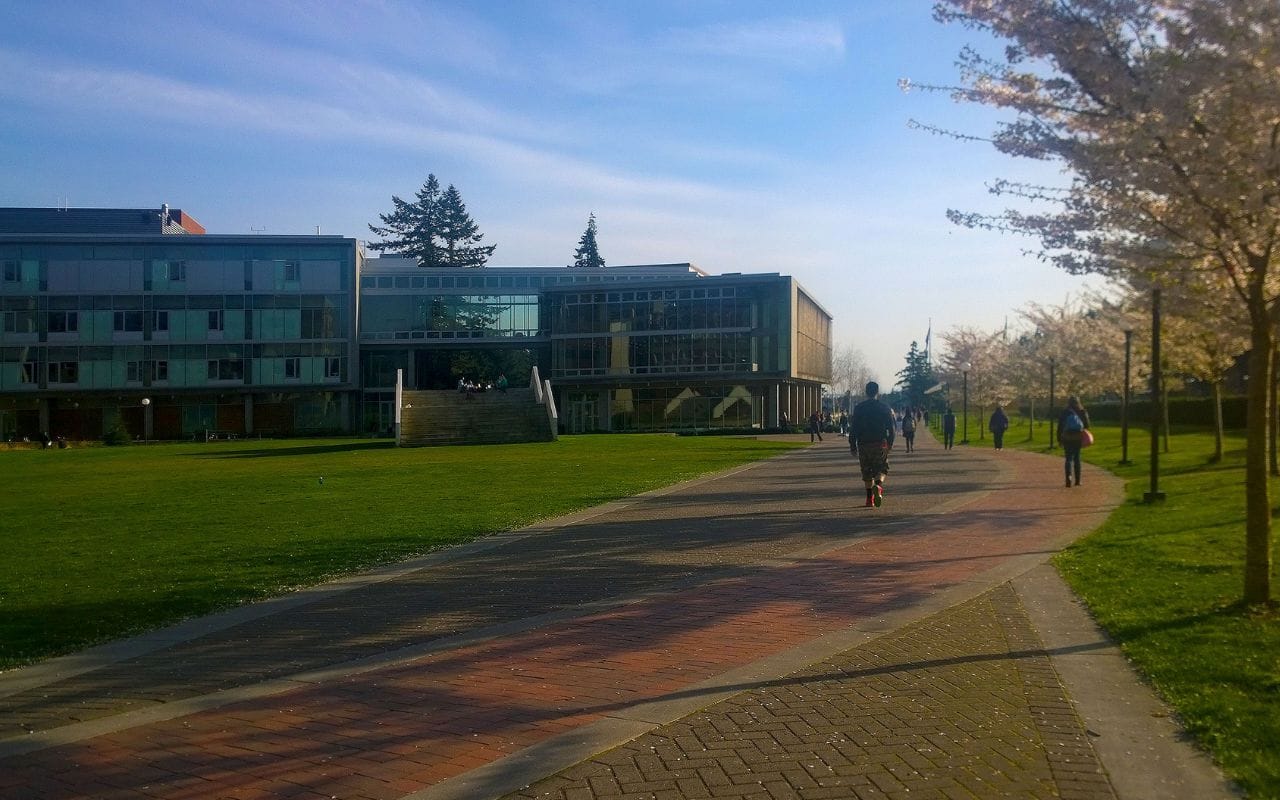Access thousands of exclusive scholarships
for free
Confused about the definition of a liberal arts college? A Bachelor of Arts?, Research Universities? Will I be studying painting or theater? The short answer is no (unless you decide otherwise).
Unlike a curriculum focusing on professional courses or vocational skills, a graduate program at a liberal arts college focuses on a wide range of subjects in humanities and sciences to cultivate critical thinking and prepare you to become a well-rounded student. In this blog, we'll explore what exactly a liberal arts college entails, the valuable degree you'll earn, the various opportunities available, and the key characteristics to help you determine if it's the right choice for you.
Register on Bold.org and leverage our scholarship search tool to uncover many exclusive scholarship offerings from community colleges and private or public universities.

Explaining the Basics: What Does "Liberal Arts" Even Mean?
The Oxford Dictionary defines Liberal Arts as "academic subjects such as literature, philosophy, mathematics, and social and physical sciences distinct from professional and technical subjects." In simpler terms, it highlights a wide range of subjects focused on developing critical thinking and reasoning skills and a well-rounded understanding of the world.
You will learn more about history, social sciences, art, and science instead of learning one technical skill needed for a particular profession.
Furthermore, Princeton University defines a liberal arts education as providing a broad intellectual foundation in various aspects of humanistic inquiry. But what exactly is a liberal arts school, and what does "humanistic inquiry" mean?
Essentially, it's all about exploring and understanding what makes us human – our history, culture, literature, philosophy, and how we express ourselves through art and language. It's about asking big questions, like what it means to be alive, how societies develop, and what values shape our world.
So, when Liberal Arts refers to humanistic inquiry, they're talking about diving deep into the human experience and gaining a richer understanding of ourselves and our place in the world. A liberal arts degree will teach students to identify problems and choose the ones to focus on to aim to make society a better place.

Knowledge in the Arts, Social Sciences, Humanities, and Natural Sciences
A liberal arts education includes various disciplines, each crucial to a comprehensive understanding of the world:
The arts, including literature, visual, or performing arts, nurture creativity and facilitate self-expression.
Social Sciences liberal arts majors zoom into the intricacies of human behavior and societies, with fields like psychology, sociology, and anthropology offering insights into our collective interactions and societal structures.
Humanities subjects, such as philosophy, history, and languages, serve as platforms for our critical thinking skills and contemplation of the human experience. These curriculums prompt us to ponder societal patterns and question the persistence of conflicts like war, the nature of political science, and the subjective nature of history as a framework for interpreting time and space from countering perspectives.
Get Matched to Thousands of Scholarships
Create your Bold.org profile to access thousands of exclusive scholarships, available only on Bold.org.
Create Free ProfileNatural sciences, with disciplines like biology, chemistry, and physics, these majors provide a priceless understanding and general knowledge of the world, enabling us to comprehend the fundamental principles governing the universe.
These pillars of knowledge constitute the bedrock of a liberal arts education, empowering students with the skills and knowledge necessary to navigate an increasingly complex, globalized society.
For instance, a liberal arts degree may encourage individuals to challenge the very foundations of Western education by questioning what has been omitted from historical narratives. Also, many top liberal arts colleges and universities are now incorporating courses that not only present conventional perspectives but also shed light on overlooked knowledge and histories.
This progressive curriculum revision provides a more holistic understanding of our shared human story. It embraces a more inclusive education for future generations and institutions.

Why Pick a Liberal Arts College?
Choosing a career right after high school can be overwhelming. If it feels like the world is trying to decide for you, you are not alone. What is lucrative and what is not? Are family members trying to impose their choices? This kind of noise, in addition to the multiple new responsibilities as a student, can actually block you from choosing the best decision that aligns with who you are.
If you value a well-rounded education, individualized attention, and the opportunity to explore diverse interests, a liberal arts college may be your ideal choice. A liberal arts college offers an educational experience beyond learning or memorizing. It fosters intellectual curiosity, nurtures personal growth, and empowers you to become a thoughtful, engaged citizen of the world.
Also, a liberal arts degree offers you more time to make a decision in your career. One of the benefits of a liberal arts college degree is that you can explore what you like for a few years without committing to a specific subject.
By not having to pick a major right away, you can start figuring out how you want to spend your daily life (and what you want in your day-to-day life is a strong sign of where you should go).
Remember: You will spend tons of time working on a subject, and although it takes time to become good at something, make sure a part of you enjoys whatever that subject is.
You may not know what you like, but you can start deciding what you don't like. By knowing what you don't enjoy, you can learn what kind of job or professional setting you may want to explore.
The concept of liberal arts comes from ancient Greece, where creative problem-solving, arts and sciences, philosophy, and politics were explored. Currently, people don't have the same amount of time to explore every field, but liberal studies offer an opportunity to get close to this kind of experiential learning for at least half of your college journey.

The Humanities Highlight: Digging Into Those Interesting Courses
The Humanities liberal arts curriculum is designed to broaden the student body of knowledge and understanding of human civilization by exploring interdisciplinary studies in literature, philosophy, history, religion, music, art, and more.
From East Asian cultures to Western traditions, Digital Humanities, or Storytelling in Artificial Intelligence, liberal arts courses in humanities offer dynamic insights into diverse civilizations and topics, empowering students to engage critically with the world and enrich their educational journey.
Science curricula often focus on interdisciplinary and even laboratory-based learning while growing to include skills in scientific computing and data-oriented thinking. These science courses will provide an ideal foundation in chemistry or biology and quantitative and computational research.
In addition, students who pick fields like Engineering will also learn the fundamental principles of engineering sciences and engineering design and get to practice through advanced courses and independent projects.
Liberal Arts courses will provide plenty of opportunities to study the natural sciences, social sciences, and humanities, and they will provide a curriculum that prepares students for a diverse array of careers and soft skills that are extremely useful for the workplace.
These diverse degree programs' depth and flexibility empower graduates to emerge as leaders across various fields, including law school, engineering, computer science, business, medical school, and public service, addressing diverse societal needs.

What Doesn't Count as a Liberal Arts Education
Within the bachelor's degree programs, including colleges and universities, the main difference that defines what does not count as liberal arts education is prioritizing career-oriented majors for professional preparation.
For example, colleges offering business administration degrees, such as the University of Pennsylvania's Wharton School, engineering programs for undergraduate degrees, like those at the Massachusetts Institute of Technology, or nursing programs, such as those at Johns Hopkins University, may not provide the same emphasis on interdisciplinary learning as liberal arts institutions.
These career-driven programs cater to students seeking specialized skills and industry-specific knowledge different from the goal of lberal arts tradition. If you are clear about the career path you want, these programs offer rigorous training tailored to meet the demands of particular professions, such as business, engineering, or healthcare.
A Professional program may lack the holistic approach to education in liberal arts colleges, where critical thinking, communication, and a well-rounded understanding of the human experience are central. Still, they may offer the right path for you.
Liberal Arts Degree: Where Can it Take You?
The interdisciplinary nature of a liberal arts education prepares graduates with invaluable skills desired by employers across various industries. Critical thinking, communication, problem-solving, and adaptability are qualities honed through a liberal arts curriculum.
Whether you choose to pursue further education, such as a master's or Ph.D., or you decide to enter the workforce, liberal arts graduates are well-prepared to thrive in dynamic and ever-evolving environments.
Many companies like Google offer apprenticeships or entry-level positions that can have access to liberal arts degrees. On the other hand, smaller companies want well-grounded people so they can train new grads in diverse positions. Additionally, liberal arts colleges offer resources to prepare students for the workplace, such as interview prep or resume builders.

Discussion and Personal Connections Are Emphasized at Liberal Arts Colleges
One of the benefits of liberal arts education is fostering meaningful dialogue and personal connections. (I highly recommend not to underestimate the power of connections during college, which is at the heart of the educational experience at liberal arts colleges.)
Also, the small class sizes and interactive seminars create an environment that helps vibrant discussions and collaborative learning. Professors prioritize student engagement, encouraging intellectual exploration.
The community of liberal arts colleges promotes lasting relationships among students and faculty, providing invaluable support and mentorship opportunities through the liberal arts tradition.
Liberal Arts Colleges vs. Research Universities
Regarding higher education, one of the critical decisions students face is choosing between a liberal arts college and a research university. While both offer unique advantages, they differ significantly in their approach to education and academic focus.
Liberal arts colleges emphasize a more broad education encompassing humanities, social sciences, arts and sciences. These institutions prioritize undergraduate teaching and typically have smaller classes, fostering intimate learning environments and opportunities for close interaction with professors.
In contrast, research universities place a stronger emphasis on research. They may offer a broader range of academic programs and resources, including graduate studies and innovative research facilities.
Private Institutions vs. Public Universities
Choosing between a private liberal arts college and a public research university depends on individual preferences, academic goals, and financial circumstances.
Students should carefully research and compare all institutions and options. Consider factors such as campus culture, academic programs, financial aid offerings, and post-graduation outcomes, such as graduate degree options, to make an informed decision that aligns with their educational aspirations and values.
Another important decision is deciding between private and public institutions. Graduate students must consider factors such as cost, financial aid opportunities, and campus resources.
What Kind of Student Are You?
Are you always aiming for excellent grades? Or are you a student who likes to focus on exploring different subjects and courses and prioritize other things in life? These characteristics should play a vital role in a student's journey.
For instance, while private colleges may have higher tuition rates, they often offer generous financial aid packages to offset expenses (for excellent students). On the other hand, public universities may offer lower tuition rates for in-state residents but higher rates for out-of-state students.
However, public institutions may also provide access to state-funded scholarships and grants.

Entry-Level Jobs for Liberal Arts Majors
You may have heard misconceptions about the practicality of a liberal arts degree. Can you get a job with a liberal arts degree? The answer is yes. Graduates are well-equipped for various entry-level positions across industries.
Liberal Arts Schools embrace communication skills, critical thinking skills, and problem-solving skills. This valuable knowledge cultivated through a liberal arts education is not only valuable for life but also highly valued by employers.
Making students with diverse liberal arts majors desirable candidates for roles in fields such as marketing, communications, consulting, and nonprofit organizations.
Consider applying for summer internships to develop professional skills. Internships can prepare you for the workplace and build professional relationships.
What Are Some of the Best Liberal Arts Colleges?
It is difficult to define "best liberal arts colleges" since each student's journey is different. I recommend looking into this blog, where you can find information about how to choose a college and the importance of making a decision tailored to your specific needs and desires.
However, many liberal arts colleges nationwide offer exceptional academic programs, dedicated faculty, and fun campus communities and activities. From prestigious institutions like Williams College to small liberal arts colleges like Pomona College, students have many options based on their preferences and academic interests.
Should I Attend a Liberal Arts College?
Whether to attend a liberal arts college or not ultimately depends on your academic goals, learning style, and personal preferences. If you value a well-rounded education, close interaction with faculty, and a tight-knit community, it might be the choice for you. However, if you prefer a larger and more research-focused environment with a broader range of academic offerings, a research university could better suit your needs.
Will I Gain Research Experience in a Liberal Arts College?
While liberal arts colleges may not have the same extensive research opportunities as research universities, many offer undergraduate research programs and opportunities for hands-on learning.
It's important to consider collaborating with faculty on research projects. Showing faculty your interest in research can provide opportunities that allow students to gain valuable experience and skills that complement their classroom learning of a liberal arts major.
Remember: A huge part of your educational experience is on you. Make sure to use momentum when you feel like you are prepared to ask for additional opportunities during your undergraduate education.
10 Reasons to Consider Attending A Liberal Arts College
- Small class sizes for personalized attention with close interaction with faculty and mentors.
- A diverse range of academic programs and interdisciplinary studies.
- Strong alumni networks, career resources, and access to internship and study abroad opportunities.
- Emphasis on critical thinking and communication skills.
- Opportunities for undergraduate research and hands-on learning.
- Vibrant campus communities and extracurricular activities.
- Encouragement of intellectual curiosity and exploration.
- Preparation for a wide range of careers and graduate studies.
- Emphasis on ethical leadership with the cultivation of lifelong learning and personal growth.
- Supportive and inclusive campus environments and commitment to diversity, equity, and inclusion.

Frequently Asked Questions About Liberal Arts Colleges
What is a liberal arts college?
A liberal arts college is an institution that offers diverse education in humanities, social sciences, natural sciences, and the arts. It fosters critical thinking and prepares students to become well-rounded individuals. It is not just focused on vocational skills but on providing a broad-based foundation for lifelong learning.
What are the key differences between a liberal arts college and a research university?
Liberal arts colleges prioritize undergraduate teaching, smaller classes, and a more intimate learning environment. Research universities, on the other hand, emphasize research, offer a broader range of academic programs, and may have larger class sizes.
Choosing between a liberal arts college and another higher education setting depends on individual preferences, academic goals, and financial circumstances. Consider factors such as campus culture, educational programs, financial aid offerings, and post-graduation outcomes to make an informed decision.
What career opportunities are available for liberal arts graduates?
Despite misconceptions, liberal arts graduates are well-equipped for various entry-level positions across industries. Critical thinking, communication, and problem-solving skills are developed during a liberal arts program.
These skills are highly valued by employers, making them desirable candidates for roles in marketing, communications, consulting, and nonprofit organizations, among others. They also open doors to other graduate programs where you can explore more specific coursework.
Join Bold.org and utilize their scholarship search function to discover countless exclusive scholarship options!


